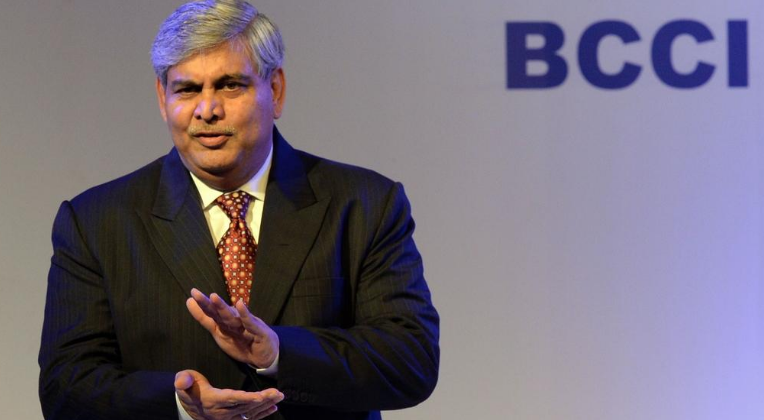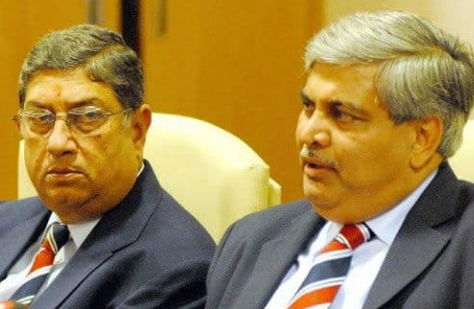Shashank Redemption: The Other Side to the Anti Indian Facade of the Outgoing ICC Chairman | Outside Edge

Shashank Manohar, as the ICC Chairman, was very keen to do away with the Big Three model simply because it stood in the way of global development of the game and cricket’s sustainability in the long run.
There is no single action or endeavour that brings a man or woman closer to actualisation in life than redemption. It is an extremely rewarding enterprise for the conscience, but like all human effort, comes with a catch. Redemption is both bitter and sweet. Invariably and painfully so. It lays you down bare, and provides the world a reminder of your misadventures. An avenue to criticise, taint the epitaph even. It hardly matters whether it was deliberate or just sheer fate. The course correction you have made subsequently would, of course, earn you accolades. Unless you are Shashank Manohar that is.
The lawyer from Nagpur who, until last week, was at the helm of International Cricket Council (ICC) as its chairman, is an ‘anti-national’. Well, not the conventional socio-political branding that’s slapped on anyone and anything remotely critical of the government. But a connection, invariably, is there too. After all, sport mirrors society. Manohar became an anti-national after Indian cricket adapted the widely used and abused phrase for its own whimsical, and at times, petty mudslinging.
Manohar, former president of the Board of Control for Cricket in India — and who became chairman of the International Cricket Council (ICC) with the backing of the BCCI — is anti Indian cricket for various reasons. The narrative has been more-or-less made mainstream by the media clout of those at the helm of the BCCI polity. However, when you look beyond the smoke screens of quotes, interviews and sources providing information on cricket’s internal politics, one thing becomes clear. Manohar’s anti-India stance begins and ends with money — the ICC revenue sharing model to be exact.
Also Read | Lin Dan Retirement: Modern Badminton’s Moody Star Bids Adieu
Now, Manohar was not the BCCI president when the Big Three revenue sharing model was adopted by the ICC in 2014. His two tenures at the helm of the Indian Board came between 2008 and 2011, and 2015-16. He was, however, very much therabouts in the Board’s upper echelons when the lopsided revenue-sharing system was formulated and implemented by India, Australia and England, much to the dismay of the other, financially struggling cricket playing countries.
In 2016, Manohar replaced his not-so-good friend N Srinivasan as the ICC chief for a two-year tenure. He stated his mandate right at the start of his first stint. Manohar was very keen to do away with the Big Three model simply because it stood in the way of global development of the game and cricket’s sustainability in the long run. It doesn’t require rocket science or a mastery of economic theory to see he was right. The Indian administrator stood by his word and in 2017, when the new eight-year financial cycle began, the ICC scrapped the Big Three model and a new, better if not perfect or completely equitable, system was put in place.
The new model reduced the BCCI's share of ICC revenue and offered identical amounts to seven of the game's Full Members. In the new system, the BCCI would receive $293 million across the eight-year cycle which ends in 2025. The England and Wales Cricket Board (ECB) stands to get $143 million, Zimbabwe Cricket would receive $94 million and the remaining seven Full Members, including Cricket Australia, get $132 million each. Associate Members (92 as of now) would receive a total funding of $280 million from the pie.
The BCCI has reasons to be eternally miffed at Manohar, whose interventions, along with the collective will of the ICC Board Members, withstood the clout of the Indian lobby in 2017. The negotiations, as per reports at the time, lasted more than a week. BCCI was fighting tooth and nail to keep the revenue fixed at $440 million (the money it stood to receive if the ICC followed the Big Three model). ECB had a marginal reduction while Cricket Australia’s share remained the same, just that it was now on par with what South Africa, Pakistan, New Zealand, Sri Lanka, Bangladesh and the West Indies. These changes were cleared by an overwhelming majority in the ICC Board — 14 votes to one — the BCCI being the naysayer.
It is easy to imagine how this money could go a long way in helping ailing Test Playing nations such as Pakistan, Sri Lanka, the West Indies and Zimbabwe. These teams were part of a small yet very vibrant cricketing culture, which, by the turn of the century, was aspiring to go global. The Indian cricket board, which was on its way to become the financial behemoth it is now, had other ideas. Maximising its own revenue share seemed the Board’s one and only priority as it muscled the rest of the cricket playing countries to submit to its will with the dangling carrot being a hugely beneficial bilateral series — home or away.
It is exactly how things are panning out at the moment on the fate of the ICC World T20 in Australia later this year. The BCCI, it seems, does not want it to happen so that it could use the window for the Indian Premier League (IPL). Australia understands the revenue potential and also the risks involved in staging a world event amidst a raging pandemic. The choice is easier now with the bigger business proposition — a tour by the Indian team slotted for December.
Things could have played out differently had Manohar been at the helm. There could be a reason why the decision on the World Cup was deferred twice in the last two months. Suddenly, it doesn’t seem a sheer coincidence that the decision would be made in July, conveniently after the tenure of Manohar, whose presence in the ICC has been a thorn for the BCCI.
Also Read | FIFA’s Relief Fund Needs to Reach Indian Football’s Grassroots to Help Save Domestic Structure
Manohar is, no doubt, a polarising figure in India. Nobody can claim he is beyond blemish. If he has climbed up the BCCI hierarchy, taking on the likes of Srinivasan among others, then he is no doubt a political power player. Becoming one is a necessity more than a matter of choice in cricket administration. However, at the helm of international cricket, Manohar showed a different side. He gave precedence to the larger good of the nations and the game, and also oversaw sweeping reforms in the way the game is run and played.
Some of the lesser talked about yet important reforms which took place under his tenure included easing the process of granting Full Membership (provided all criteria are met) and removing Affiliate Membership altogether, making international cricket a two-tier affair (Full Member and Associate Member). He also appointed an independent female director to the ICC Board, a move keeping the women’s game in mind. Another significant reform was giving equal weightage to the votes of all Board members regardless of the membership status. All members could attend the Annual General Meeting (ICC AGM) as well.
As far as the game is concerned, the ICC Test Championship was envisaged and started under his tenure while talks are on about an ODI League, stalled of course by the coronavirus crisis as well as the reluctance of big Boards such as the BCCI, who are guarding calendars for their domestic money-spinning T20 leagues.

Shashank Manohar (right) is not blemish free by any measure and the fact that he came up the BCCI ranks dealing with power players such N Srinivasan among many others is proof that he knows the intricacies of the game.
While aspiring to become a global presence like FIFA is a longshot, the ICC has taken baby steps towards adopting some of the ways of functioning of the biggest sport in the world. FIFA releases a fund of $500,000 per annum to all its 211 member associations (provided they are not under suspension) regardless of their status or ranking. Its revenue generation revolves around its biggest tournament — the World Cup. However, its revenue sharing model is democratic, equitable and fair. Besides the annual fund, it also releases development funds to the smaller nations apart from global projects from time to time.
The cricket economy is far from embracing such an equitable model. However, the ICC seemed to strive to start that journey under Manohar. The hope now is that the good work will be taken forward by the next in chair, after the subsequent, and inevitable, realignment of power in the world body. It is evident that Manohar’s exit — he had the option to contest the elections for a third (and last) tenure as chairman — is also a sign of the increasing clout of the BCCI in the ICC. The natural progression from here would be the placing of another BCCI man or someone acceptable by the Indian board in the hot seat so that its vested agenda can be pushed to the fore. That could mean the rolling back of some of the reforms, if not all.
Also Read | Sir Everton Weekes: The West Indies Pioneer Who Redefined Cricket’s Colour in Whites
However, it needs to be remembered that the anti-India Manohar has, inadvertently, done good for the BCCI too. No matter how safe the Indian board feels sitting atop the pile of money shored up by the rich IPL, any faltering of the global cricket economy, and the ruin of the game’s hotbeds, would spell disaster. There won’t be any money without the game, will it? And, for the game’s survival and sustainable growth, money needs to be pumped in where it is needed most now. This is all the more important with the world reeling under the Covid-19 crisis.
It won’t be an exaggeration to say that Manohar, in his time at the ICC, acted in the better interest of cricket. It is unfortunate that the best interests of the game were not exactly in tune with the best interests of the BCCI. That tells us quite a lot about how Indian cricket works, don’t it?
Manohar, arguably, has helped redeem some goodwill for the BCCI, if not anything else. After all, like how another lawyer from India, MK Gandhi, said, redemption is not an exclusive right. “No human being is so bad as to be beyond redemption, no human being is so perfect as to warrant his destroying him whom he wrongly considers to be wholly evil,” the Mahatma had said. Manohar and the BCCI are no exceptions.
However, the attempt from India has always been to brand Manohar’s actions as those stemming out of his conflict and poor equations with some of the big guns of the BCCI. That is immature, unethical and farfetched to say the least.
It reminds one of a rumination by American philosopher Elbert Hubbard in his essay on automotive pioneer John North Willys. “You do nothing, say nothing, and be nothing, and you'll never be criticized.” Hubbard’s philosophical take on criticism, wrongly attributed to Aristotle in many publications, is universal in nature. Criticism, however, tends to have a shelf life till history weeds out the right from the wrong. Criticism is short lived, especially if the person at the receiving end is right. Manohar was almost always right at the ICC as far as the larger good is concerned. So, his legacy in the game could end up outlasting some of the bigger, much celebrated cricket administrators India have gifted to the game. That would, perhaps, complete the lawyer’s redemption.
Get the latest reports & analysis with people's perspective on Protests, movements & deep analytical videos, discussions of the current affairs in your Telegram app. Subscribe to NewsClick's Telegram channel & get Real-Time updates on stories, as they get published on our website.
























